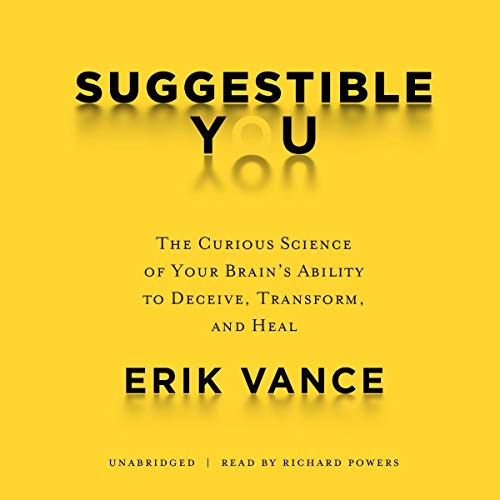
Como cliente Amazon Prime obtén 3 meses de Audible gratis

Suggestible You
The Curious Science of Your Brain’s Ability to Deceive, Transform, and Heal
No se ha podido añadir a la cesta
Error al eliminar la lista de deseos.
Se ha producido un error al añadirlo a la biblioteca
Se ha producido un error al seguir el podcast
Error al dejar de seguir el podcast
Escúchalo ahora gratis con tu suscripción a Audible
Compra ahora por 12,99 €
-
Narrado por:
-
Richard Powers
-
De:
-
Erik Vance
Acerca de este título
This riveting narrative explores the world of placebos, hypnosis, false memories, and neurology to reveal the groundbreaking science of our suggestible minds.
Could the secrets to personal health lie within our own brains? Journalist Erik Vance explores the surprising ways our expectations and beliefs influence our bodily responses to pain, disease, and everyday events.
Drawing on centuries of research and interviews with leading experts in the field, Vance takes us on a fascinating adventure from Harvard's research labs to a witch doctor's office in Catemaco, Mexico, to an alternative medicine school near Beijing (often called "China's Hogwarts"). Vance's firsthand dispatches will change the way you think - and feel.
Continuing the success of National Geographic's brain books and rounding out our pop science category, this book shows how expectations, beliefs, and self-deception can actively change our bodies and minds. Vance builds a case for our "internal pharmacy" - the very real chemical reactions our brains produce when we think we are experiencing pain or healing, actual or perceived.
Supporting this idea is centuries of placebo research in a range of forms, from sugar pills to shock waves; studies of alternative medicine techniques heralded and condemned in different parts of the world (think crystals and chakras); and, most recently, major advances in brain mapping technology.
Thanks to this technology, we're learning how we might leverage our suggestibility (or lack thereof) for personalized medicine, and Vance brings us to the front lines of such study.
©2016 Erik Vance (P)2016 Blackstone Audio, Inc.
















